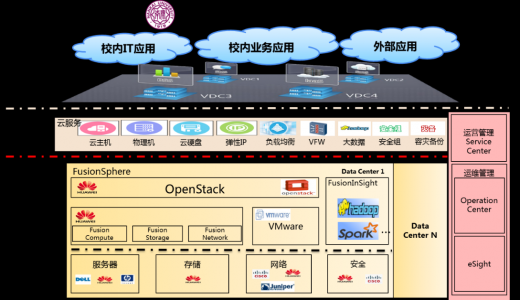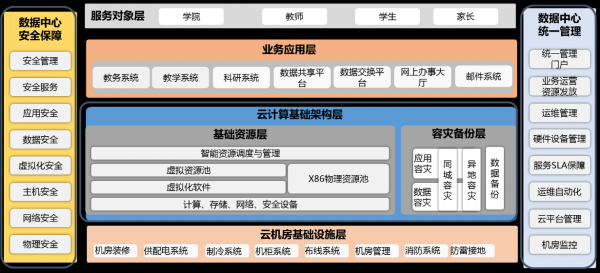Huawei cloud platform helps Nankai University to create a smart campus
Abstract: In recent years, Nankai University has been strengthening the campus information support service capacity, building a smart campus with Nankai characteristics, promoting administrative management and teaching and research reform with information technology, supporting students' online learning, online interaction between teachers and students, and online services for institutions. Support the coordinated development of “one school, three districtsâ€.
Nankai University (NKU), referred to as “Nankaiâ€, was founded in 1904 and was formally established in 1919. It is a comprehensive university founded by Yan Xiu and Zhang Bojun in the spirit of education and national salvation.
In recent years, Nankai University has been strengthening the campus information support service capacity, building a smart campus with Nankai characteristics, promoting administrative management and teaching and research reforms with information technology, supporting students' online learning, online interaction between teachers and students, and online services for institutions. One school, three districts, "coordinated development. At the same time, it is hoped that by integrating the teaching information infrastructure of Nankai University, a cloud data center platform based on “one school, three districts†and multiple centers will be built to provide a learning environment for resource sharing, and various academic resources and research collaboration platforms will be built for Nankai. The university has become a world-class and has laid a solid foundation in the field of education and information technology.
In order to improve the efficiency of data center resource utilization, reduce the management cost of personnel to the data center, improve the user experience, and improve the IT service capability of the data center. Nankai University hopes to build a school-level cloud service management platform, which is used to realize unified management of all kinds of software and hardware resources in the school data center; on the other hand, it can help users to the data center resources for the users of the secondary departments of the school. Application, flexible resource allocation and other functions. Specifically, Nankai University's requirements for the cloud service management platform are as follows:
l The platform is required to provide management functions covering computing, storage, network, security, and converged facilities, provide operational functions such as metering and billing, and have complete and reliable operation and maintenance functions such as monitoring, analysis, early warning, and alarm.
l Requires a reasonable platform architecture, good scalability, flexible deployment, and open platform interfaces to support third-party system access.
In order to help Nankai University achieve its management requirements, Huawei provided Huawei's FusionCloud cloud service management platform solution through careful analysis.

Nankai University-level cloud service management overall architecture
The overall architecture of the solution consists of the infrastructure layer, resource pool layer, cloud service layer, and management layer:
l Infrastructure layer: The physical infrastructure such as servers, storage, and networks form the infrastructure of the converged resource pool.
l Resource pool layer: The virtualization layer provides basic computing, storage, and network virtualization capabilities. Under the management of FusionSphere OpenStack, virtualized software, such as Huawei FusionSphere, virtualizes physical resources such as computing, storage, and network to provide a unified computing, storage, and network resource pool.
l Management layer: Unified management of resource pools provided by multiple data center cloud resource layers, providing unified operations and operation and maintenance management, building a unified pool of integrated resources, and realizing resource sharing.
l Cloud service layer: Based on the operation and operation and maintenance capabilities provided by the management layer, matching the service scenarios, and implementing the secondary operation services of resources through the service catalog.
The Huawei FusionCloud cloud service management platform solution provides a unified data center management platform for Nankai University. At the same time, the platform proposes the concept of “agile operation, streamlined operation and maintenanceâ€, and provides advanced management solutions for service guarantee and service orchestration of distributed cloud data centers.

Nankai University-level cloud service platform solution
The overall benefits of the solution include:
The distributed cloud data center uses the converged architecture (computing, storage, and network convergence) as the basic unit of the resource pool to support the refined operation of IT services through automated management and virtualization platforms. The core concept of a distributed cloud data center is: physical distribution, logical unity. It can integrate Nankai University's multiple data centers to provide services like a unified data center and enhance enterprise IT efficiency through multi-data center convergence.
In addition, the distributed cloud data center will bring unprecedented value and a new experience to Nankai University. Its value includes:
Reduce TCO and increase ROI: Distributed cloud data centers use virtualization technology to eliminate the dependence of software on the hardware of running software, enabling IT directors at Nankai University to transform underutilized infrastructure into resilient, automated and secure The computing resource pool, the provider is used on demand.
Improve business agility, speed up online, and improve user satisfaction: Distributed cloud data centers provide on-demand service capabilities on top of virtualization technologies, and distributed cloud data centers provide comprehensive management and business automation. ability.
Reduce IT management and maintenance resources, improve IT governance capabilities: Distributed cloud data centers provide self-service capabilities, and users of secondary departments of Nankai University can apply for services on their own, reduce reliance on IT operations, and manage IT. More effective.
Unified and flexible cloud data center management capabilities: Distributed cloud data center resources come from multiple physical data centers, with diverse resource types and complex management requirements. In response to this situation, Huawei distributed cloud data center proposed unified management and managed each data center on the same management interface.
Innovative service model: Based on the measurement and statistics of resource use by various departments or business units of Nankai University, it provides a basis for the school education department or business unit to share the resource cost.
In summary, Nankai University deploys the cloud service management platform to integrate and centrally manage data resources scattered across various business systems through unified data standards to provide external query services and sharing. At the same time, through Huawei's ManageOne unified management platform, it realizes dynamic resource allocation, lower operation and maintenance management costs, rapid deployment and fast acquisition, and high reliability and high availability.
According to the relevant person in charge of Nankai University, based on Huawei's FusionCloud solution, Nankai University will be able to provide rich cloud services for all levels of departments and colleges in the school, which will significantly promote the actual business and effectively promote the deep integration of information technology and education. It laid a good foundation for Nankai University to realize a smart campus.
Ningbo Wellcome Trading Co., Ltd. , https://www.huike-homecare.com